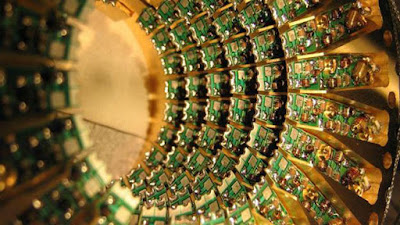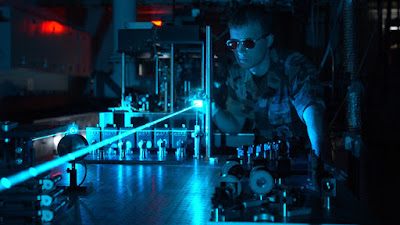Photo of the D-Wave quantum computer (Klarreich).
The creation of quantum computers will offer the ability to
carry out complex calculations in record speed. This increased calculation
capability will be revolutionary to science and technology, but there are also
negatives associated with quantum computers and their implications.
Specifically traditional forms of security and encryption will cease to be useful (McMahone).
Quantum computers will be able to decipher RSA encryption and MD5 Hashes in
just seconds; tasks that would have taken traditional computers years to
billions of years to decode. In that sense the creation of a functioning
quantum computer is essentially an arms race with the first victor being able
to decrypt all off their enemies encoded transmissions or any interchange of
digital information around the globe (McMahone). For that reason danger associated with
quantum computers are very real and potentially devastating.
Example of encrypted data traveling in quantum bit pairs.
Data stored by electron orientation.
With every new creation there is
also opportunity for innovation and new possibilities. One such opportunity
that has already been theorized is quantum cryptography or the encryption of
electrons at the quantum level. There are several different ways that quantum
cryptography could be carried out and is still only theoretical at this point.
Most quantum cryptography theories revolve around the principle that data can
be carried on a single stream of electrons. Other theories focus on QKD or
Quantum Key Distribution, but the core principles are effectively the same (Weiner). This
concept of quantum cryptography is protected by a principle that dates all the
way back to 1927, long before even traditional computers were invented and is
called the Heisenberg Uncertainty Principle.
A very localized gaussian wave function of a free particle represented in two-dimensional space. The expanding waves represent increasing uncertainty in position with respect to time.
Within
Heisenberg’s Uncertainty Principle there is an inter-related concept between
position and momentum. The principle effectively states that you can know one
or the other, but not both at the same time; at least not with any great
precision (Wilkins). The reason for this is the way electrons travel is a cross between
waves and particles at the quantum mechanical level. In order to determine the
location of a traveling electron you must hit it with another electron to
observe the interaction. This diverts the original electron and is why it is
impossible to know both position and momentum at the same time (Uncertainty Principle). The faster
moving the electron you use to hit the observational electron the more
accurately you will know its position, but less accurately its speed. If a
slower electron is used you will know the observational electrons momentum, but
not its position. In both cases the original electron is diverted and its
course altered; this is the basis for the theory behind quantum cryptography
and how information can be safeguarded against intrusion from outside
observers.
Quantum information would travel similar to lasers.
To view the data would be to block the stream, destroying the information.
Should
eavesdroppers try to listen in on or view any message the transmission would
immediately be altered or broken and the stream would shuts down the
transmission with zero bits of information being compromised (besides maximum
message length). To even try viewing a quantum encryption stream is to destroy
it (Quantum Cryptography). This is what makes quantum cryptography so powerful as a potential for
future security and encryption processes. The next generation of computers will offer extraordinary
new opportunities and open up new possibilities, but one thing is for certain,
the data of the future must be secured and protected and quantum cryptography
is the future.
Refrences:
Refrences:
"Quantum Cryptography." Wikipedia.
Web. 16 Oct. 2015. <https://en.wikipedia.org/wiki/Quantum_cryptography>.
McMahone, Peter. “Introduction to
Quantum Cryptography." <https://www.youtube.com/watch?v=Gxlxt5D1KDA>.
YouTube. YouTube, 8 Nov. 2014. Web. 16 Oct. 2015.
"Uncertainty Principle." Wikipedia.
Web. 16 Oct. 2015. <https://en.wikipedia.org/wiki/Uncertainty_principle>.
Wilkins, Alasdair. "Quantum computers could overturn Heisenberg's uncertainty principle.” Io9.com. io9.com, 30 Aug 2010. Web. 17
Oct 2015. <http://io9.com/5602933/quantum-computers-could-overturn-heisenbergs-uncertainty-principle>.
Klarreich, Erica. "Is
That Quantum Computer for Real?” Quanta Magazine. Wired.com, 23 Aug 2013.
Web. 17 Oct 2015. <http://www.wired.com/2013/08/quantum-cryptography-computing/>.
Weiner, Sophie "Quantum Internet Is The Most Secure
Form Of Cryptography Yet” animalnewyork.com. animalnewyork.com, 18
Sep 2014. Web. 17 Oct 2015. < http://animalnewyork.com/2014/quantum-internet-cryptography/>.




No comments:
Post a Comment